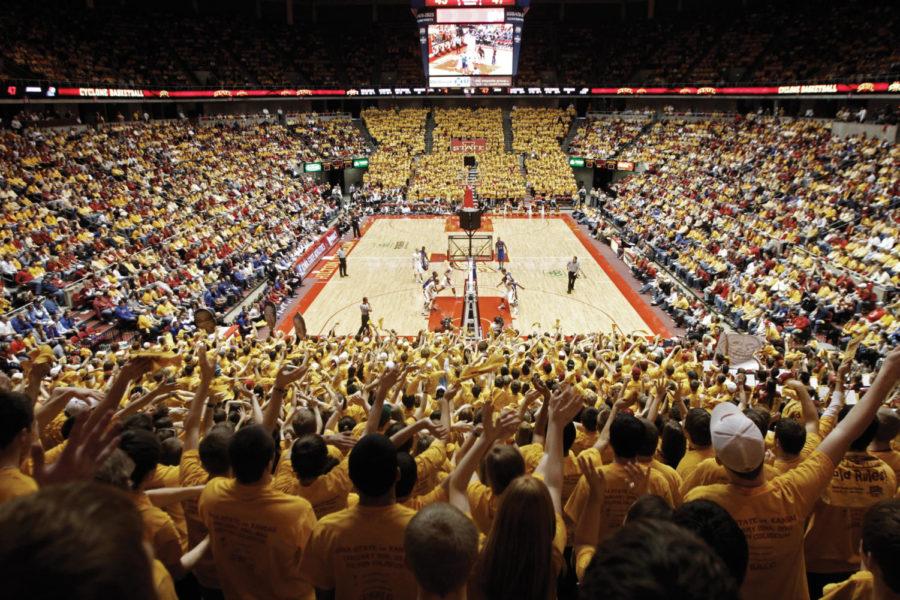HOOPS: Iowa State oversells tickets to draw more students
November 9, 2012
Fred Hoiberg called for it at his introductory news conference in the spring of 2010.
“Larry Brown was my first coach with the Pacers,” Hoiberg said when he was introduced in April 2010. “He said that Hilton Coliseum was the hardest arena he ever had to coach in, and Larry Brown’s been coaching since the last turn of the century.
“I want that atmosphere back. I need that atmosphere back.”
Last season, Hoiberg and his team saw the return of Hilton Magic. The ISU men’s basketball team ranked No. 24 in college basketball in attendance, averaging 13,015 fans per game.
Fans rushed onto the court twice for top-25 victories against Kansas and Baylor, and the team sold out five games. It was the first time since 1992 — when Hoiberg could be found in a Cyclone uniform — the team averaged more than 13,000 fans per game.
But missing for many games was a large chunk of the student season ticket holders.
“Last year we only had two games where over 50 percent of the students who actually had tickets went to the games,” said Jamie Pollard, ISU athletic director.
The student section at Hilton Coliseum has a capacity of 2,500 and the half-full mark of 1,250 was only surpassed twice. Those games were against Iowa and Kansas, and the student capacity still only reached 52 percent and 51 percent.
“Last year, we had 2,500 student seats, and only 1,300 [students] came to the Kansas game,” Pollard said. “There were 1,200 student tickets that weren’t used for the Kansas game.”
Pollard and his Student Advisory Committee, made up of students from various on-campus student groups, talked about the student attendance issue at its spring meeting.
“We started talking about ideas that would get more students actually in the arena,” Pollard said. “If only 50 percent of the students who have tickets are going to come, you can technically offer it to more students.”
Eventually it was decided to oversell student tickets, and the athletic department sold 3,500 student tickets for this season. The model followed what some other schools do including Kansas, Kansas State and Maryland.
Fellow Big 12 institution Kansas State sells 6,200 combo passes, which allows students admission to football and men’s basketball games. The student capacity for men’s basketball is 3,900.
“I would say we’re in a similar situation to Iowa State,” said Scott Garrett, assistant athletic director of ticketing and fan strategies at Kansas State. “There’s a handful of games where more than 50 percent of the students who bought passes show up.”
The Wildcats can allow admission to basketball games to 63 percent of its pass holders, and this season Iowa State will be able to allow it to around 71 percent of the 3,500 holders.
When the Cyclones reach the capacity, the other 1,000 ticket holders would likely be turned away. It isn’t clear, however, if that will be a problem.
Kansas State, overselling by 2,300 seats, hasn’t run into trouble with its plan as of yet.
“We’ve not been in any danger the last two years, and we’ve been ranked basically in the top 25 for every game we’ve played at home in those two years,” Garrett said.
An exception, Garrett said, was one game when between 15 and 20 students showed up after tip-off and the arena was full.
The biggest question at Iowa State has been whether students will be refunded if denied entry. Pollard and his advisory group decided students will be refunded if the arena is full and they cannot get into the game.
“As Jamie and I have discussed, I think it’s a good option as long as there’s a refund mechanism in place,” said Jared Knight, president of the student body.
Kansas State doesn’t offer a refund but communicates to students that what is offered is a “pass.” Garrett said he understands why other schools might offer a refund as customer service when starting an overselling program.
Without overselling, another option was to reduce the student section capacity.
“One of the other options talked about was shrinking the student section to 1,300 and just make it the lower bowl,” Pollard said. “I don’t think that’s in the best interest of the students for the long term.”
For now, the athletic department will see how overselling plays out during the 2012-13 season.
“It’s a great problem to have,” Pollard said. “In the end, let’s see how this year goes. Maybe we have to sell more than 3,500 to get it [where we want it].”







